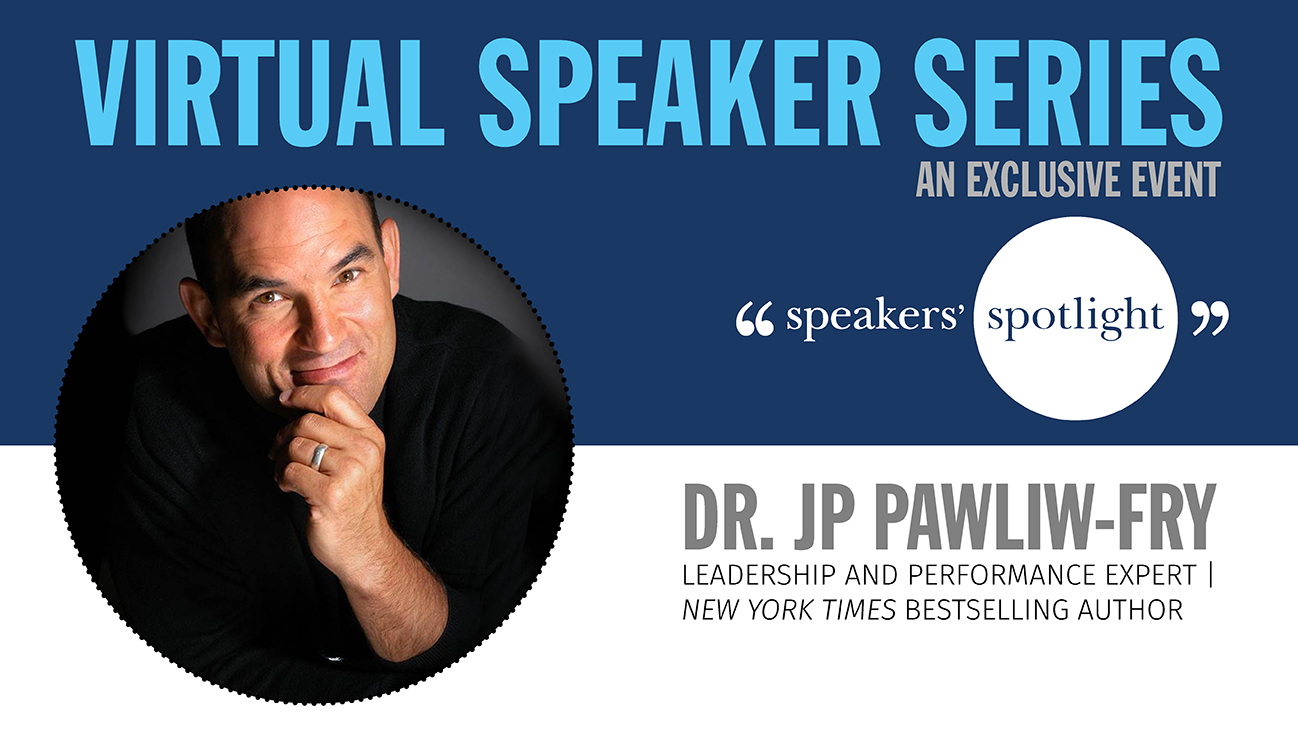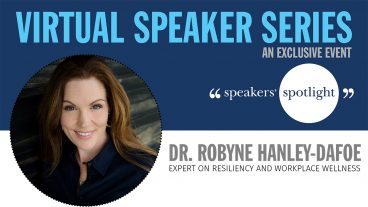As we settle into this new normal we’ve all been facing new challenges. It’s more important than ever to learn how to manage uncertainty and stress, while also flexing our ability to adapt. Doing that means staying focused and clearheaded.
Joining us for our Virtual Speaker Series, Dr. JP Pawliw-Fry offered an action plan to do just that. As a leadership and performance expert, and author of New York Times bestseller Performing Under Pressure, JP was naturally suited to guide us through some strategies to succeed in this current environment.
To frame his talk, JP asked, “How do you show up in difficult moments?” As a point of reference, he explained the idea of “the calm person in the boat.” It comes from accounts of Vietnamese refugees who fled by sea following the end of the Vietnam War in 1975. Overcrowded and with limited resources on rough seas, the journey across the ocean was a harrowing one. On these ships, the natural leadership of calm, cool-headed individuals would appear organically and often spread among the other passengers.
Now during the pandemic, we are in our own moment that calls on us to deal with many similar issues: managing meager resources, choosing a course to follow among great uncertainty, and facing new stresses on a weekly (if not daily) basis. JP said we all have an aspiration to succeed and adapt, so we have to look at what gets in our way.
The Last 8%
To better understand these obstacles, JP explained his idea of “the last 8%”. This is based on the notion of psychological research that shows most people can accomplish up to 92% of what they set out to do, whether that’s with a specific task or major project or even a difficult conversation. It’s the last 8% of those demanding situations that are the hardest to follow through on, and that’s often where trouble arises because we instinctively avoid these obstacles. JP said that it’s important to watch out for our “predictable default behaviours” in these situations and figure out how to manage them.
Transform Our Thinking
Learning how to manage these parts of our work and life requires us to transform our thinking. Being aware is the first step and should help us trigger a planned mental response, because the our natural response is not always the most helpful. These difficult “last 8%” situations often feel like a crisis, a moment of pressure. But JP said, that’s the start of a negative pattern that makes overcoming them more difficult. We have a physiological response when we think we’re in a crisis—it makes us tense up, feel defensive, and less open to solutions or discussion.
Instead, JP said, we should think of this kind of pressure as an opportunity or challenge. If we think of our “last 8%” situations as something to overcome, we can call on our agility and ingenuity. It’s important not to seek a perfect solution, and instead take risks and try using new skills.
To increase our chances of success in these moments, JP provided a set of questions to keep in mind when we find ourselves in these challenging moments:
- Control – What can I control? What am I trying to control that I really cannot?
- Opportunity – How can I see this “last 8%” as an opportunity? Try to make a list.
- Action – What action can I immediately take to gain some momentum?
Finally, as part of this effort to transform our approach to these tough situations, JP recommended developing a relationship with someone that we can check in with regularly (ideally weekly). This can be a coach, a mentor, a therapist, a work partner. By giving ourselves a chance to discuss our challenges, we can get perspective and more quickly spot our mental stumbling blocks.
Wrapping up, JP highlighted a couple other elements to keep in mind that should aid us in our effort to stay calm, positive and effective while facing challenges.
Empathy – Don’t Confuse Impact for Intent
We often feel before we think and confuse the impact someone’s action has on us for their intention. It’s natural for us to jump to judge someone and feel frustrated or even angry, but often this is a knee jerk reaction not based on the reality of the situation. Before reacting, take a breather and reread that email or replay that conversation in your head. JP said it’s often surprising how something can make us overly emotional one moment and seem inconsequential the next.
Habits
Lastly, JP highlighted that as much as these skills need to be developed by good habits there are other habits that can help us succeed. Think about your morning/daily routines—are they healthy? Are they giving us a good baseline to accomplish our goals? Try to incorporate physical activity and work to be more mindful every day.
Download JP’s cheat sheet for his presentation to practice these strategies
For over twenty years, Dr. JP Pawliw-Fry’s curiosity and passion for helping people manage their emotions has driven his research into the skills and tools required to build a culture of exceptional leadership. JP is the New York Times bestselling author of Performing Under Pressure and speaks to organizations around the world on emotional intelligence, resilience and change. He is the host of the popular podcast, Last 8% Morning.
Speakers’ Spotlight has been offering virtual presentations since 2009. We work with several speakers who are experienced in delivering virtual presentations on a variety of topics pertinent to today’s changing environment. If interested, contact us for more information.




